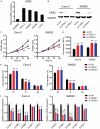Up-regulated CKS2 promotes tumor progression and predicts a poor prognosis in human colorectal cancer
- PMID: 26609478
- PMCID: PMC4633900
Up-regulated CKS2 promotes tumor progression and predicts a poor prognosis in human colorectal cancer
Abstract
Cyclin-dependent kinases regulatory subunit 2 (CKS2) is a cyclin-dependent kinase-interacting protein, which is essential for cell cycle regulation. Elevated expression of CKS2 has been demonstrated in multiple types of human malignancies. However, the clinical significance, oncogenic functions and related mechanisms of CKS2 in colorectal cancer (CRC) remain largely unexplored. In this study, data from Oncomine database revealed that CKS2 is significantly up-regulated in CRC tissues compared with their normal counterparts. Immunohistochemical analysis of a CRC tissue microarray demonstrated that elevated CKS2 expression is closely associated with enhanced TNM stage, larger tumor size and a poor prognosis in patients with CRC. Multivariate Cox regression analysis revealed that CKS2 and TNM stage are two independent prognostic factors for CRC. Suppression of CKS2 expression resulted in decreased cell viability, increased cell apoptosis, cell cycle arrest and reduced expression of cyclins in Caco-2 and SW620 cells. Furthermore, gain and loss of function studies demonstrated that CKS2 promotes cell invasion in CRC cells through regulating claudin1. Taken together, our study reveal that CKS2 is promising prognostic indicator and contributes to tumor progression in CRC, and support that CKS2-related signaling may represent a novel target for CRC therapy.
Keywords: CKS2; claudin1; colorectal cancer; growth; invasion; prognosis.
Figures






Similar articles
-
Cyclin-dependent kinase subunit 2 overexpression promotes tumor progression and predicts poor prognosis in uterine leiomyosarcoma.Oncol Lett. 2019 Sep;18(3):2845-2852. doi: 10.3892/ol.2019.10668. Epub 2019 Jul 25. Oncol Lett. 2019. PMID: 31452763 Free PMC article.
-
Cyclin-Dependent Kinase Regulatory Subunit 2 Indicated Poor Prognosis and Facilitated Aggressive Phenotype of Hepatocellular Carcinoma.Dis Markers. 2019 Oct 22;2019:8964015. doi: 10.1155/2019/8964015. eCollection 2019. Dis Markers. 2019. PMID: 31781310 Free PMC article.
-
Expression and clinical significance of cyclin kinase subunit 2 in colorectal cancer.Oncol Lett. 2013 Sep;6(3):777-780. doi: 10.3892/ol.2013.1456. Epub 2013 Jul 11. Oncol Lett. 2013. PMID: 24137409 Free PMC article.
-
Expression of cyclin kinase subunit 2 in human breast cancer and its prognostic significance.Int J Clin Exp Pathol. 2014 Dec 1;7(12):8593-601. eCollection 2014. Int J Clin Exp Pathol. 2014. PMID: 25674223 Free PMC article.
-
Biological functions and therapeutic potential of CKS2 in human cancer.Front Oncol. 2024 Aug 12;14:1424569. doi: 10.3389/fonc.2024.1424569. eCollection 2024. Front Oncol. 2024. PMID: 39188686 Free PMC article. Review.
Cited by
-
Positive Caricature Transcriptomic Effects Associated with Broad Genomic Aberrations in Colorectal Cancer.Sci Rep. 2018 Oct 4;8(1):14826. doi: 10.1038/s41598-018-32884-3. Sci Rep. 2018. PMID: 30287863 Free PMC article.
-
Expression Profile and Molecular Basis of Cyclin-Dependent Kinases Regulatory Subunit 2 in Endometrial Carcinoma Detected by Diversified Methods.Pathol Oncol Res. 2022 May 27;28:1610307. doi: 10.3389/pore.2022.1610307. eCollection 2022. Pathol Oncol Res. 2022. PMID: 35693634 Free PMC article.
-
Cyclin-dependent kinase subunit 2 overexpression promotes tumor progression and predicts poor prognosis in uterine leiomyosarcoma.Oncol Lett. 2019 Sep;18(3):2845-2852. doi: 10.3892/ol.2019.10668. Epub 2019 Jul 25. Oncol Lett. 2019. PMID: 31452763 Free PMC article.
-
CKS2 Overexpression Correlates with Prognosis and Immune Cell Infiltration in Lung Adenocarcinoma: A Comprehensive Study based on Bioinformatics and Experiments.J Cancer. 2021 Oct 11;12(23):6964-6978. doi: 10.7150/jca.63625. eCollection 2021. J Cancer. 2021. PMID: 34729099 Free PMC article.
-
Identification of CKS2 as a novel prognostic biomarker and potential therapeutic target for oral squamous cell carcinoma.Transl Cancer Res. 2023 Sep 30;12(9):2276-2293. doi: 10.21037/tcr-23-511. Epub 2023 Sep 12. Transl Cancer Res. 2023. PMID: 37859732 Free PMC article.
References
-
- Fedirko V, Romieu I, Aleksandrova K, Pischon T, Trichopoulos D, Peeters PH, Romaguera-Bosch D, Bueno-de-Mesquita HB, Dahm CC, Overvad K, Chirlaque MD, Johansen C, Bidstrup PE, Dalton SO, Gunter MJ, Wark PA, Norat T, Halkjaer J, Tjonneland A, Dik VK, Siersema PD, Boutron-Ruault MC, Dossus L, Bastide N, Kuhn T, Kaaks R, Boeing H, Trichopoulou A, Klinaki E, Katsoulis M, Pala V, Panico S, Tumino R, Palli D, Vineis P, Weiderpass E, Skeie G, Gonzalez CA, Sanchez MJ, Barricarte A, Amiano P, Quiros JR, Manjer J, Jirstrom K, Ljuslinder I, Palmqvist R, Khaw KT, Wareham N, Bradbury KE, Stepien M, Duarte-Salles T, Riboli E, Jenab M. Prediagnostic anthropometry and survival after colorectal cancer diagnosis in Western European populations. Int J Cancer. 2014;135:1949–1960. - PubMed
-
- Brenner H, Kloor M, Pox CP. Colorectal cancer. Lancet. 2014;383:1490–1502. - PubMed
-
- Siegel R, Desantis C, Jemal A. Colorectal cancer statistics, 2014. CA Cancer J Clin. 2014;64:104–117. - PubMed
-
- Weidle UH, Birzele F, Kruger A. Molecular targets and pathways involved in liver metastasis of colorectal cancer. Clin Exp Metastasis. 2015;32:623–35. - PubMed
-
- Jung Y, Lee S, Choi HS, Kim SN, Lee E, Shin Y, Seo J, Kim B, Jung Y, Kim WK, Chun HK, Lee WY, Kim J. Clinical validation of colorectal cancer biomarkers identified from bioinformatics analysis of public expression data. Clin Cancer Res. 2011;17:700–709. - PubMed
LinkOut - more resources
Full Text Sources
